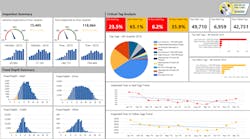NASHVILLE. In a global move, tire maker Michelin is adding radio frequency identification or “RFID” tags to all of its truck tires in an effort to provide its commercial truck customers with better data to help control their ongoing tire costs.
“This [RFID] platform allows fleets to better track their tire assets and better understand the lifecycle of their tire casings,” Ralph Dimenna, COO of the Michelin Americas Truck Tires division, explained to Fleet Owner during a meeting at the 2017 Technology & Maintenance Council (TMC) annual conference.
Dimenna noted that feedback from Michelin’s fleet advisory council indicated that more detailed tire information could help them better deal with the “pain points” of their businesses. That’s why Michelin forged ahead to add RFID tags to all of its truck tires, not just the ones it sells in the U.S.
“This is a worldwide platform; they are now in 98% of our [truck tire] products worldwide,” he emphasized. “And these are standard tags; anyone can access them if they have an RFID reader.”
The company is also rolling out some enhancements to its Michelin Tire Care service, launched back in 2015.
Designed to assist fleets in identifying and addressing tire issues that lead to downtime, low mileage, high fuel costs and safety risks, Michelin said 20% of the vehicles inspected via its tire care program over the last year were “Red Tag” events; critical situations that require immediate attention to avoid an emergency roadside service (ERS) event or CSA violation. A further 63% of vehicles inspected via the program were flagged with “Yellow Tags,” which highlights issues that can lead to longer term costs.
Ron Reid, operations manager for New York-based Transervice Logistics and a Tire Care customer, noted in a statement that the program helped his fleet cut its averaging ERS calls per month from 5.5 down to 2.5, saving $2,000 per month. Currently Michelin said it services over 260 fleets and more than 36,000 commercial vehicles nationwide.
In terms of the upgrades Michelin is adding to this program, they include:
- Improved program hardware and software: rugged CAT Smart device has Android smartphone look and feel with 4G capability and PDA Windows App for more “customer-friendly” operation. New measurement devices allow for faster and more accurate readings as well.
- Actionable Fleet dashboard: this will display in-depth tire summary including critical analysis of Red Tag and Yellow Tag events, number of vehicles inspected, number of tires inspected and top 10 issues.
- Red Tag Resolution: as Red and Yellow Tag events are identified during an inspection, they’ll be corrected with a vehicle history at the end showing what work as performed and when it was completed.
- Pricing options: In addition to a flat per-inspection fee, Michelin will now provide a set tire maintenance program for an hourly rate.
- Self Fit: an in-house solution that allows fleets to perform their own inspections via a flat monthly fee with no restrictions on the number of inspections.
- Road Ready: an option that uses the TirePass lanes at Love’s Travel Centers truck stops to perform Tire Care inspections, optimal for line haul fleets running coast to coast.



